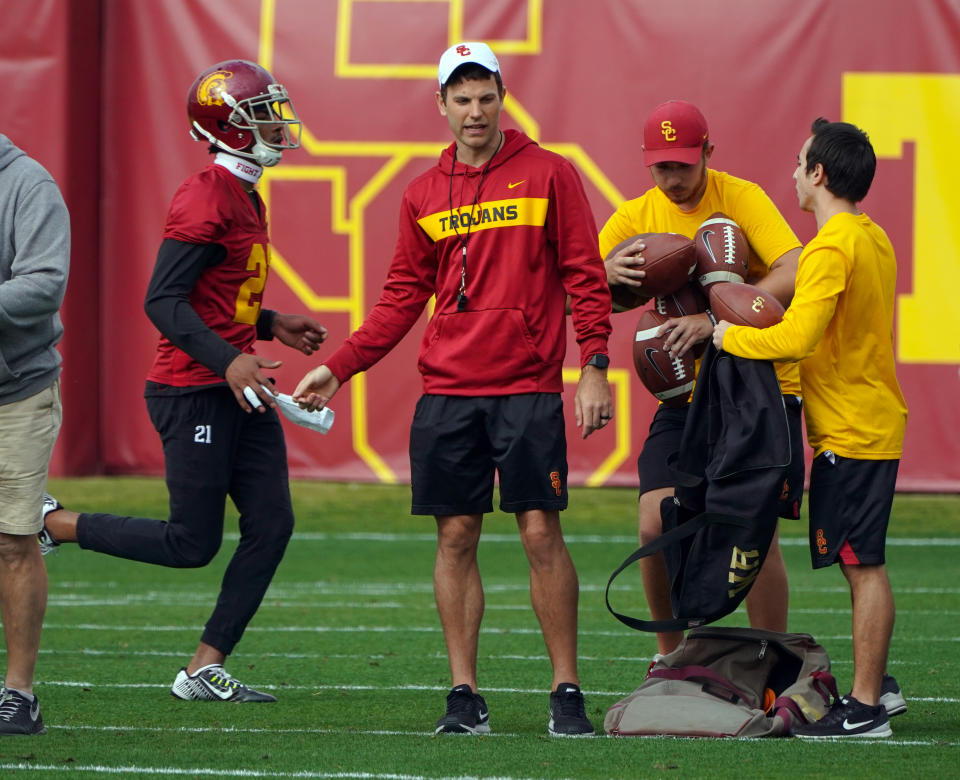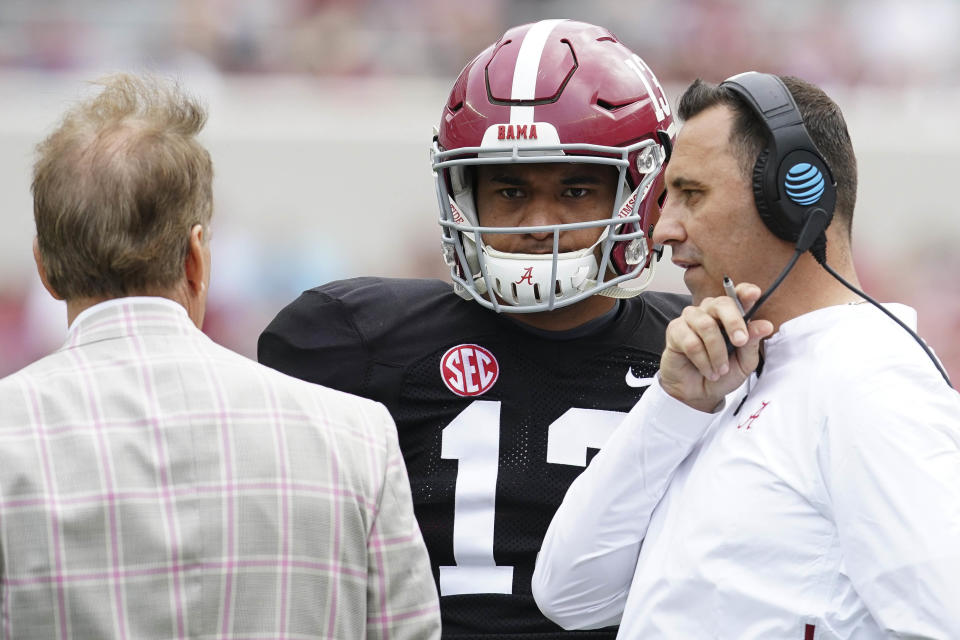10 college football coordinators who could make or break their team this season
Forty names, games, teams and minutiae making news in college football (back braces sold separately in Knoxville, where Tennessee fans are trying to perform the necessary ethical backbend to excuse star defensive back Bryce Thompson's words and actions over the weekend):
[More Dash: Predictions | 10 worrisome games | 5 bets to make]
SECOND QUARTER
HOW COORDINATED IS YOUR TEAM?
Coordinator changes usually happen after things have gone wrong during the season, which is why they get the public’s pulse racing during the winter and spring. The new guy with the new scheme will always be better than the old guy, right? Well, it’s time to find out if the staff changes designed to make everything OK really work.
The Dash examines 10 coordinators in high-profile new roles whose performance could very well affect the direction of this season:
Graham Harrell (11), USC. Arrives from: North Texas, where he coordinated the No. 20 offense in the nation last year. Takes over: the No. 84 offense in 2018. The Trojans (5-7) scored 17 or fewer points four times last season, and had fewer than 335 total yards five times.
[Join or create a 2019 Yahoo College Fantasy Football league for free today]
Harrell is Option B as the USC offensive savior, hired after Kliff Kingsbury jilted the Trojans to become the most amazing NFL hire in quite some time. Like Kingsbury, Harrell is from the Mike Leach Air Raid family tree, and his job will be maximizing the gifts of sophomore quarterback JT Daniels and a highly recruited collection of wide receivers. Old-school USC fans will likely have to accept the continued withering of their traditional running game (which last year produced just 134 yards per game, lowest since 2001) in favor of fully embracing the spread-and-chuck philosophy. Harrell will have to be good right away, because five of USC’s first six games are against teams that had top-30 defenses in 2018.

Josh Gattis (12), Michigan. Arrives from: Alabama, where he was co-offensive coordinator and coached the best wide receiver corps this side of Clemson. Takes over: the No. 50 offense in the nation in 2018, but one that returns everything but a bell cow running back.
Gattis has never called plays but comes highly touted after working under James Franklin and Nick Saban. His biggest job will be coaxing the best out of quarterback Shea Patterson, who had a productive season after transferring from Mississippi but still seemed a bit under wraps within the overall Harbaugh construct. Expect the Wolverines to play faster (at least situationally) and probably turn Patterson loose a bit more to connect with a very good collection of receivers.
Kendal Briles (13), Florida State. Arrives from: Houston, and before that Florida Atlantic, and before that Baylor, where he was offensive coordinator. Takes over: a mess, at least in terms of 2018 productivity. The Seminoles were No. 103 in total offense, No. 109 in sacks allowed, No. 113 in scoring offense and No. 118 in turnovers committed in their first year under Willie Taggart.
Like Harrell and Gattis, Briles will be expected to inject some tempo and spread principles into an offense that failed to do anything well last year. The good news for him is that the offensive line can’t be any worse, and the quarterbacking behind it should improve as well (sophomore James Blackman beat out Wisconsin transfer Alex Hornibrook for the starting job). The best thing Briles can do is re-establish running back Cam Akers, whose productivity dipped and fumbles rose from 2017 to ’18.
Alex Grinch (14), Oklahoma. Arrives from: Ohio State, where he was co-defensive coordinator, and before that Washington State. Takes over: a defense that was so weak, it took a Heisman Trophy-winning quarterback to compensate for it. The Sooners gave up more yards per play (6.1) and per game (454) than any team in school history.
Is he the Grinch who saved defense in Norman? We’ll see. A lot of young players got experience last year and should be better for it in 2019. Grinch will try to put a lighter, faster defense on the field that shoots for disruption at the line of scrimmage and creates more turnovers than last year’s meager 11 in 14 games. He’s also accustomed to the demands placed on a defense when your offense is playing at a super-fast pace and scoring a lot.
Greg Mattison (15), Ohio State. Arrives from: rival Michigan, where he was the defensive line coach for the last four years and the coordinator before that. Takes over: a defense that was, by several statistical measures, the worst in school history.
The 69-year-old Mattison has seen it all, having been a coordinator at Notre Dame, Michigan and in the NFL. Snagging him from the arch rival was the first intriguing staff move by Ryan Day; now we’ll see how well it works. Ohio State is expected to employ a more simplified scheme than it did under Greg Schiano, whose young unit looked distinctly confused much of last season. You could hardly count the number of apparent assignments busts in 2018, many of which led to players looking at each other and trying to decide who should have been where. More will be expected this year of a maturing defense that merely had to record enough stops last season, given the Buckeyes’ juggernaut offense.
Steve Sarkisian (16), Alabama. Arrives from: the NFL, where he’d been the Atlanta Falcons offensive coordinator. Takes over: the best offense in Alabama history.
It’s been a wild decade for Sark, careening from head coach at Washington to disgraced head coach at USC to a rebound job as Alabama analyst to the NFL and now back to Tuscaloosa. More than a few Falcons fans made Sark the scapegoat for the team’s underwhelming 2018 season and management seemed to agree, firing him on New Year’s Eve. (Red-zone play calling and productivity were particular issues.) But it would take a truly lousy coordinator to screw up what he’s inheriting in Tuscaloosa with quarterback Tua Tagovailoa and the rest of the offense.

Andy Ludwig (17), Utah. Arrives from: Vanderbilt, his ninth college offensive coordinator gig at a variety of levels. Takes over: an offense that ranked 71st nationally and blew hot and cold — 35.4 points per game in wins, 14.8 in losses, including a total of 10 points in 120 minutes against Washington.
Kyle Whittingham changes offensive coordinators the way most of us change socks, and in Ludwig he’s dialing back into his own past to get the guy who was his Utah OC from 2005-08. Ludwig will be tasked with putting some pop into a unit that ranked 10th in the underwhelming Pac-12 in terms of scrimmage plays longer than 20 or 30 yards against FBS competition. A lot of people are picking the Utes to win the Pac-12 South, and Ludwig's work with senior quarterback Tyler Huntley will be key to that.
Sean Gleeson (18), Oklahoma State. Arrives from: Princeton, which makes this one of the most intriguing job transitions in higher education in 2019. Takes over: an offense that will always be a Mike Gundy production, and almost always be explosive.
Imagine this: You’re from New Jersey; you attend elite Division III school Williams; you coach football, baseball and bowling at a Catholic high school in Jersey; you get a college job at Fairleigh Dickinson, then another at Princeton; and now all of a sudden you’re moving to Stillwater, Oklahoma. This is Gleeson’s life. At least in terms of offensive acumen, this seems like a fit — Gleeson coordinated a Princeton offense that scored 40 or more points eight times in 10 games last season.
Rich Rodriguez and Mike MacIntyre (19), Mississippi. Arrive from: unemployment and Colorado, respectively. Take over: an offense (Rodriguez) that ranked in the top 10 last year in yards per game and top five in yards per play but is now rebuilding; a defense (McIntyre) that was the worst in the SEC but returns an abundance of experience.
This is an interesting arrangement. Third-year Ole Miss coach Matt Luke has basically ceded control of his future to a pair of former head coaches with established track records who were fired from their last jobs in the Pac-12. Rod and Mac definitely know their football, but they don’t know the modern SEC landscape. (MacIntyre was a position coach at Ole Miss from 1999-2002.) No idea how this is going to turn out.
Gus Malzahn (20), Auburn. Arrives from: the head coach’s office. Takes over: his own offense.
Malzahn looked at last year’s mess of an offense and hired the best man for the play-calling job in 2019: himself. He’s always been a gifted man with a play sheet in his hands, and now he’s getting back to his roots. But after four seasons of middling-at-best quarterback play, one of the progenitors of the Tempo Revolution needs to show that his offense is still relevant in 2019. His job may well depend on it.
More from Yahoo Sports:

